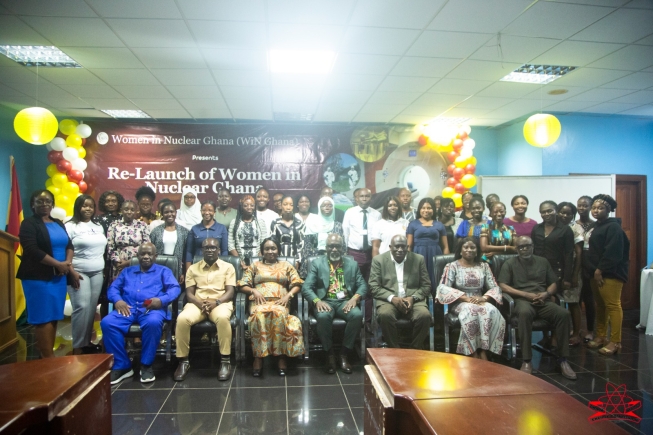
WiN Ghana re-launched to empower women in nuclear science and technology
The Ghana chapter of Women in Nuclear (WiN Ghana) has been re-launched in Accra with a renewed commitment to empowering women in nuclear science as a catalyst for Ghana’s socio-economic development.
The ceremony, held last Wednesday, was themed: “Women in Nuclear Ghana: Strengthening the Role Women Play in Nuclear Science for the Socio-Economic Development of Ghana.”
Originally launched in 2020 during the COVID-19 pandemic with six executives and 50 members, WiN Ghana encountered significant challenges during its formative years. With the re-launch, the group is now poised to take impactful action.
The Chief Director of the Ministry of Environment, Science and Technology, Madam Suweibatu Adams, stressed that revitalising WiN Ghana was a strategic necessity for national progress.
“Nuclear science is a catalyst for development in energy, health, and agriculture, yet women remain underrepresented due to systemic barriers like gender bias and limited mentorship,” she noted.
She highlighted that although the Ghana Atomic Energy Commission (GAEC) employs over 250 women, fewer than 25 per cent occupy technical positions, with even fewer in leadership roles—despite the Graduate School of Nuclear and Allied Sciences having trained approximately 150 women at the MPhil level and seven at the PhD level since 2006.
Madam Adams advocated for stronger STEM education initiatives targeting girls in secondary schools, equitable hiring practices free from gender bias, and fair promotion processes. She also emphasised the importance of mentorship, leadership development programmes, and supportive work-life policies, including flexible work arrangements and childcare support.
She cited the government’s Ghana Affirmative Action Gender Bill (2024), which mandates 30 per cent female representation in leadership by 2030, and the Science, Technology and Innovation Policy as critical enablers of progress.
The Director-General of GAEC, Prof. Samuel Boakye Dampare, underscored the urgency of addressing underrepresentation, describing the occasion as a “revitalisation” rather than merely a re-launch. He announced the 2024 appointment of Prof. Mary Adu-Poku to lead mentorship initiatives—a move aimed at combating imposter syndrome among women professionals.
“We need women not only in laboratories but also at decision-making tables—building cross-generational networks, advocating for nuclear science literacy, and forging partnerships with WiN Global and African chapters,” he urged.
Prof. Dampare celebrated trailblazers such as Prof. Aba Bentil Andam, a physics educator and former GAEC board member; Prof. Victoria Appiah, the first and only woman to serve as Deputy Director-General of GAEC; Prof. Josephine Nketsia Tabiri, the first female Director of BNARI; Prof. Paulina Amponsah, geophysicist and former Manager of Ghana’s National Data Centre under the CTBTO; and Prof. Mary Adu-Poku, foundational Director of RAMSRI, now leading GAEC’s mentorship programme. He encouraged younger women to “step up without waiting for perfection.”
In her address, Prof. Mary Adu-Poku, President of WiN Ghana and lead organiser of the event, expressed optimism that the re-launch would reinvigorate efforts to advance women’s empowerment for Ghana’s socio-economic development.
